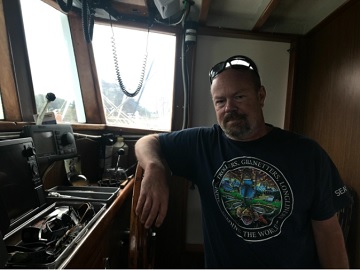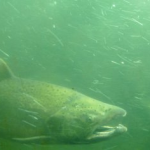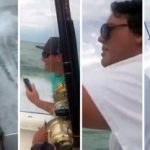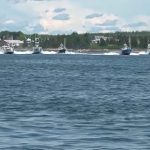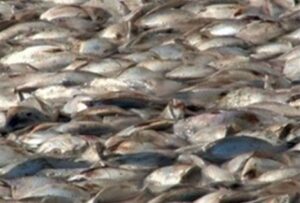Tag Archives: Pacific Fishery Management Council
Commercial salmon fishermen eye Klamath dam removal with cautious hope
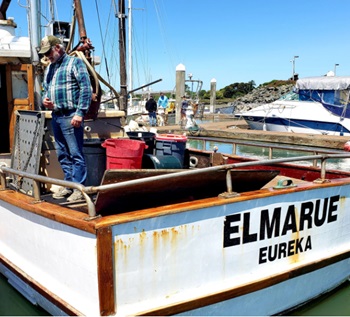 At 76, he still fishes for salmon alone. Standing in the cockpit on the stern deck of his wooden trawler, Elmarue, he can keep an eye on all six wires; when one of the lines starts to dance, he brings the fish in, stunning it with his gaff while it’s still in the water. Then he uses the tool to hook the salmon behind the gills and swings it onto the deck. “By the way, I want that fish cleaned and chilling in a single water flush within half an hour; that’s the standard,” says Dave Bitts. “I want you to enjoy eating it as much as I enjoyed catching it.”In April, for the second year in a row, the Pacific Fishery Management Council voted unanimously to close California’s commercial and recreational ocean salmon fishery. The closure was based on woefully low numbers of adult salmon expected to return to several California rivers. more, >>CLICK TO READ<< 12:58
At 76, he still fishes for salmon alone. Standing in the cockpit on the stern deck of his wooden trawler, Elmarue, he can keep an eye on all six wires; when one of the lines starts to dance, he brings the fish in, stunning it with his gaff while it’s still in the water. Then he uses the tool to hook the salmon behind the gills and swings it onto the deck. “By the way, I want that fish cleaned and chilling in a single water flush within half an hour; that’s the standard,” says Dave Bitts. “I want you to enjoy eating it as much as I enjoyed catching it.”In April, for the second year in a row, the Pacific Fishery Management Council voted unanimously to close California’s commercial and recreational ocean salmon fishery. The closure was based on woefully low numbers of adult salmon expected to return to several California rivers. more, >>CLICK TO READ<< 12:58
Some Fishermen Blame California Water Policies for Salmon Season Closures
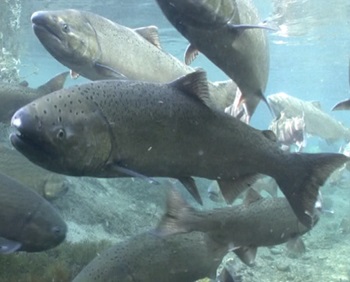 The Pacific Fishery Management Council unanimously recommended the closure of all California commercial and recreational ocean salmon fisheries through 2024, after a similar closure last year, blaming drought, climate and other factors for dwindling stocks. “While incredibly painful to fishing families and fishing communities, the Pacific Coast Federation of Fishermens Associations supports the closure,” said George Bradshaw, president of PCFFA. “We all need to be doing everything we can to give Californias salmon a chance to recover. It has to be an all hands-on deck effort to ensure survival for our Central Valley and Klamath salmon runs.” Video, more, >>click to read<< 09:14
The Pacific Fishery Management Council unanimously recommended the closure of all California commercial and recreational ocean salmon fisheries through 2024, after a similar closure last year, blaming drought, climate and other factors for dwindling stocks. “While incredibly painful to fishing families and fishing communities, the Pacific Coast Federation of Fishermens Associations supports the closure,” said George Bradshaw, president of PCFFA. “We all need to be doing everything we can to give Californias salmon a chance to recover. It has to be an all hands-on deck effort to ensure survival for our Central Valley and Klamath salmon runs.” Video, more, >>click to read<< 09:14
Federal advisory group recommends curtailed Oregon ocean salmon fishing again; closing California season
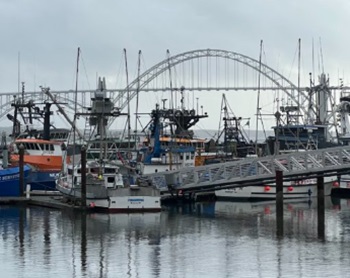 Recommendations for the ocean salmon seasons off the coasts of Oregon, California and Washington were made last week with some OK news for some fishermen and devasting news for those in California. Once again. The Pacific Fishery Management Council — which oversees fishing along the West Coast — voted unanimously Wednesday to once again shut California’s commercial and recreational chinook salmon fisheries through the end of the year. Its recommendations are similar to those made in 2023, which was the first time such a closure occurred in 14 years. Oregon and Washington fared better – but still not very good. more, >>click to read<< 08:18
Recommendations for the ocean salmon seasons off the coasts of Oregon, California and Washington were made last week with some OK news for some fishermen and devasting news for those in California. Once again. The Pacific Fishery Management Council — which oversees fishing along the West Coast — voted unanimously Wednesday to once again shut California’s commercial and recreational chinook salmon fisheries through the end of the year. Its recommendations are similar to those made in 2023, which was the first time such a closure occurred in 14 years. Oregon and Washington fared better – but still not very good. more, >>click to read<< 08:18
Federal Funding Allocated for Salmon Fishing Disaster
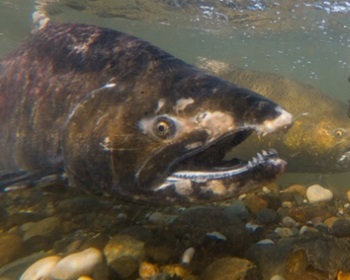 On April 6, 2023, the Pacific Fishery Management Council (PFMC) acted unanimously to recommend a full closure of California’s 2023 commercial and recreational ocean salmon seasons due to extremely low population estimates for Sacramento and Klamath river fall Chinook salmon. Within hours of the recommendation, Gov. Gavin Newsom announced his administration’s request for a federal fishery disaster declaration to support impacted communities. Looking ahead to the 2024 season, the PFMC will consider the alternatives for the 2024 salmon seasons at its meeting April 5-11 in Seattle. This meeting is open to the public. more, >>click to read<< 11:45
On April 6, 2023, the Pacific Fishery Management Council (PFMC) acted unanimously to recommend a full closure of California’s 2023 commercial and recreational ocean salmon seasons due to extremely low population estimates for Sacramento and Klamath river fall Chinook salmon. Within hours of the recommendation, Gov. Gavin Newsom announced his administration’s request for a federal fishery disaster declaration to support impacted communities. Looking ahead to the 2024 season, the PFMC will consider the alternatives for the 2024 salmon seasons at its meeting April 5-11 in Seattle. This meeting is open to the public. more, >>click to read<< 11:45
Salmon populations are struggling, bringing economic woes for California’s fishing fleet
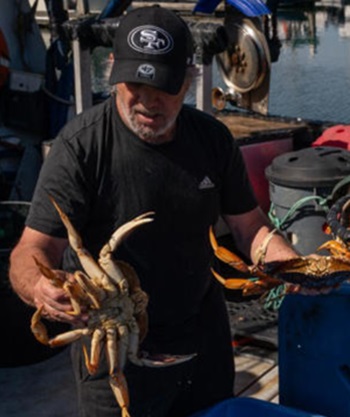 The season typically runs from May to October, but California Chinook salmon populations have declined so severely in recent years that fishery authorities are considering whether to adopt severe restrictions this season or impose a ban on fishing altogether for the second consecutive year. For those whose livelihoods revolve around catching salmon, the shutdown has brought hard times and widespread frustration. “It’s devastating. It’s absolutely devastating,” said commercial fisherman Chris Pedersen. “They’re literally killing the salmon fleet.” Pedersen, who is 64 and has been fishing for salmon since he was a boy, turned to other work over the past year to make ends meet. He has fiberglassed boats, delivered meals and built sheds at a horse ranch. “You’ve got to do whatever you can to live,” he said. Photos, video, more, >>click to read<< 07:48
The season typically runs from May to October, but California Chinook salmon populations have declined so severely in recent years that fishery authorities are considering whether to adopt severe restrictions this season or impose a ban on fishing altogether for the second consecutive year. For those whose livelihoods revolve around catching salmon, the shutdown has brought hard times and widespread frustration. “It’s devastating. It’s absolutely devastating,” said commercial fisherman Chris Pedersen. “They’re literally killing the salmon fleet.” Pedersen, who is 64 and has been fishing for salmon since he was a boy, turned to other work over the past year to make ends meet. He has fiberglassed boats, delivered meals and built sheds at a horse ranch. “You’ve got to do whatever you can to live,” he said. Photos, video, more, >>click to read<< 07:48
Sonoma County’s fishing community facing uncertain future with potential salmon season closure
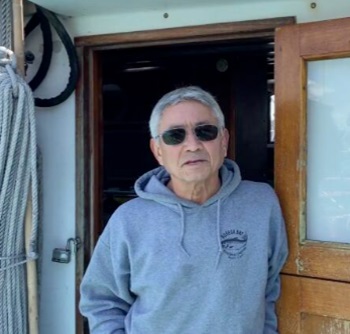 In 2024, California’s ocean salmon fishing industry stands at a critical juncture. The Pacific Fishery Management Council (PFMC), cognizant of the challenges salmon populations face due to years of drought and environmental pressures, has laid out three potential paths for the salmon fishing season off California’s coast. Dick Ogg, president of the Bodega Bay Fisherman’s Marketing Association, explains. “They need to come up with three options, each impacting us differently. Some options might leave a little room for commercial activity, but it’s all quite uncertain,” underscoring the dire straits faced by those who rely on the sea for their livelihood. The potential for another season of deep cuts or complete shutdowns looms large, posing not just an economic challenge but a threat to a way of life cherished by many generations. “This cuts to the heart of Bodega Bay,” Ogg said. “We’re a real working fishing community.” more, >>click to read<< 18:17
In 2024, California’s ocean salmon fishing industry stands at a critical juncture. The Pacific Fishery Management Council (PFMC), cognizant of the challenges salmon populations face due to years of drought and environmental pressures, has laid out three potential paths for the salmon fishing season off California’s coast. Dick Ogg, president of the Bodega Bay Fisherman’s Marketing Association, explains. “They need to come up with three options, each impacting us differently. Some options might leave a little room for commercial activity, but it’s all quite uncertain,” underscoring the dire straits faced by those who rely on the sea for their livelihood. The potential for another season of deep cuts or complete shutdowns looms large, posing not just an economic challenge but a threat to a way of life cherished by many generations. “This cuts to the heart of Bodega Bay,” Ogg said. “We’re a real working fishing community.” more, >>click to read<< 18:17
California’s commercial salmon fishermen face another disaster of a season amid proposed federal restrictions
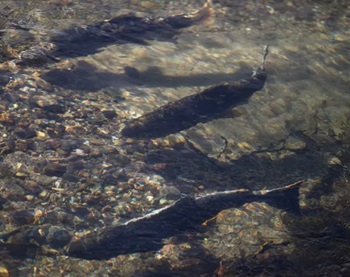 A regional fishery council is mulling three proposals for commercial salmon season, with one canceling the season entirely and the other two severely limiting how long the season would last and how many salmon could be taken. While two of the proposed options do offer limited commercial fishing opportunities, at least one local fisherman says the restrictions would significantly curb the viability of salmon fishing. “These really aren’t a viable option for anyone,” said Tim Obert, a Ben Lomond resident who’s been fishing salmon commercially for close to 20 years. Obert is president of the Santa Cruz Commercial Fishermen’s Association, sits on the state of California’s Dungeness Crab Task Force and is also a part of several working groups that advised the council in coming up with the alternative proposals. more, >>click to read<< 11:07
A regional fishery council is mulling three proposals for commercial salmon season, with one canceling the season entirely and the other two severely limiting how long the season would last and how many salmon could be taken. While two of the proposed options do offer limited commercial fishing opportunities, at least one local fisherman says the restrictions would significantly curb the viability of salmon fishing. “These really aren’t a viable option for anyone,” said Tim Obert, a Ben Lomond resident who’s been fishing salmon commercially for close to 20 years. Obert is president of the Santa Cruz Commercial Fishermen’s Association, sits on the state of California’s Dungeness Crab Task Force and is also a part of several working groups that advised the council in coming up with the alternative proposals. more, >>click to read<< 11:07
Federal Council Announces California Ocean Salmon Season Alternatives for 2024
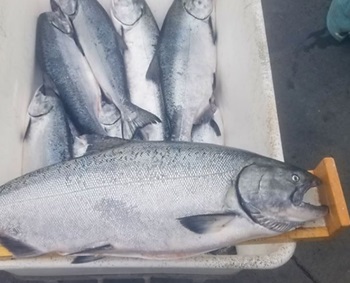 The Pacific Fishery Management Council (PFMC) has produced three options for ocean salmon seasons beginning May 16, 2024. Two of the three alternatives would authorize short ocean salmon season dates and establish small harvest limits for commercial and sport fishing off California in 2024. The third alternative would close the ocean fisheries off California for a second consecutive year. The alternatives were approved by the PFMC for public review Monday. Meanwhile, abundance of Klamath River Fall Chinook is forecast at 180,700 adults. At this level of abundance, the Pacific Coast Salmon Fishery Management Plan authorizes only low levels of fishing on these stocks, and requires management be designed to allow most of the adult population to return to the river to spawn. links, more, >>click to read<< 11:11
The Pacific Fishery Management Council (PFMC) has produced three options for ocean salmon seasons beginning May 16, 2024. Two of the three alternatives would authorize short ocean salmon season dates and establish small harvest limits for commercial and sport fishing off California in 2024. The third alternative would close the ocean fisheries off California for a second consecutive year. The alternatives were approved by the PFMC for public review Monday. Meanwhile, abundance of Klamath River Fall Chinook is forecast at 180,700 adults. At this level of abundance, the Pacific Coast Salmon Fishery Management Plan authorizes only low levels of fishing on these stocks, and requires management be designed to allow most of the adult population to return to the river to spawn. links, more, >>click to read<< 11:11
‘Simply catastrophic’: California salmon season to be restricted or shut down — again
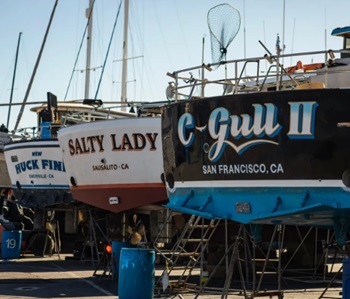 California’s fishing industry is bracing for another bad year as federal managers Monday announced plans to heavily restrict or prohibit salmon fishing again, after cancelling the entire season last year. The Pacific Fishery Management Council today released a series of options that are under consideration, all of which either ban commercial and recreational salmon fishing in the ocean off California or shorten the season and set strict catch limits. California’s commercial fleet and recreational anglers still await federal disaster aid for last year’s losses. Tommy “TF” Graham also will keep working on land. A commercial fisherman based in Bodega Bay, he got a Class A driver’s license so he could drive a truck and stay afloat through the closures. Now, when he’s not crab fishing, Graham wakes up at 3 a.m. to drive frozen and farmed salmon and other fish from around the world into San Francisco. “A guy has got to get up and put his boots on and go to work every day,” Graham said. Still, he said, “I used to be a provider, now I’m a consumer. It feels like shit, to tell you the truth.” more, >>click to read<< 21:24
California’s fishing industry is bracing for another bad year as federal managers Monday announced plans to heavily restrict or prohibit salmon fishing again, after cancelling the entire season last year. The Pacific Fishery Management Council today released a series of options that are under consideration, all of which either ban commercial and recreational salmon fishing in the ocean off California or shorten the season and set strict catch limits. California’s commercial fleet and recreational anglers still await federal disaster aid for last year’s losses. Tommy “TF” Graham also will keep working on land. A commercial fisherman based in Bodega Bay, he got a Class A driver’s license so he could drive a truck and stay afloat through the closures. Now, when he’s not crab fishing, Graham wakes up at 3 a.m. to drive frozen and farmed salmon and other fish from around the world into San Francisco. “A guy has got to get up and put his boots on and go to work every day,” Graham said. Still, he said, “I used to be a provider, now I’m a consumer. It feels like shit, to tell you the truth.” more, >>click to read<< 21:24
Fishing advocates say California salmon disaster fund is too low
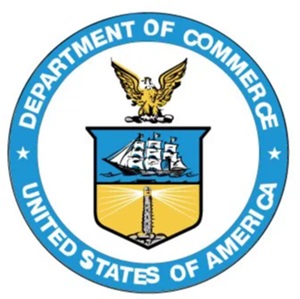 The $20.6 million allocated for federal relief for California’s Chinook salmon stocking is only two-thirds of the state’s aid request, and threatens the existence of fishing businesses, California commercial fishermen and rental recreational groups said, on Monday. In a letter to U.S. Commerce Department Secretary Gina Raimondo, the Pacific Coast Federation of Fishermen’s Association, the Golden Gate Fishermen’s Association and the Northern California Guides and Sportsmen’s Association called for “immediate full funding of salmon disaster funding assistance” at $30.7 million. Data sought by state officials. “The state’s economic analysis already falls short of expected needs, and the federal disaster aid package adds insult to injury,” fishing group leaders wrote in their joint letter. more, >>click to read<< 08:56
The $20.6 million allocated for federal relief for California’s Chinook salmon stocking is only two-thirds of the state’s aid request, and threatens the existence of fishing businesses, California commercial fishermen and rental recreational groups said, on Monday. In a letter to U.S. Commerce Department Secretary Gina Raimondo, the Pacific Coast Federation of Fishermen’s Association, the Golden Gate Fishermen’s Association and the Northern California Guides and Sportsmen’s Association called for “immediate full funding of salmon disaster funding assistance” at $30.7 million. Data sought by state officials. “The state’s economic analysis already falls short of expected needs, and the federal disaster aid package adds insult to injury,” fishing group leaders wrote in their joint letter. more, >>click to read<< 08:56
Frustrated fishermen get good news: good rockfishing, salmon fishing to return in 2024
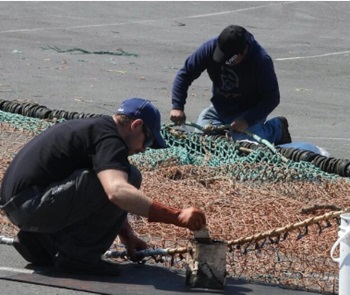 With an oversized head, bulbous eyes and narrow body, the quillback rockfish looks like a golden bullfrog armed with a quiver full of arrows on its back. Few sport fishermen want to keep, much less eat, the famously sharp and ouchy and skinny quillback, which are reeled by those seeking meatier rockfish. But it was the quillback, which is often tossed back into the sea, whose population plummet caused a shutdown that impacted the entire rockfish industry, both for commercial and for party boats operating out of Mendocino Coast’s Noyo Harbor. That mysterious plunge in quillback numbers cut off all near-shore rockfish fishing last year, causing an organized outcry by fishermen and a new plan for 2024. Photos, more, >>click to read<< 07:15
With an oversized head, bulbous eyes and narrow body, the quillback rockfish looks like a golden bullfrog armed with a quiver full of arrows on its back. Few sport fishermen want to keep, much less eat, the famously sharp and ouchy and skinny quillback, which are reeled by those seeking meatier rockfish. But it was the quillback, which is often tossed back into the sea, whose population plummet caused a shutdown that impacted the entire rockfish industry, both for commercial and for party boats operating out of Mendocino Coast’s Noyo Harbor. That mysterious plunge in quillback numbers cut off all near-shore rockfish fishing last year, causing an organized outcry by fishermen and a new plan for 2024. Photos, more, >>click to read<< 07:15

Struggling salmon fishermen getting federal help, but it may be too late
Earlier this month, two years after a request by Oregon’s governor, the U.S. Department of Commerce declared a Chinook fishery disaster for 2018, 2019 and 2020, years when local salmon populations plummeted. Fishing regulators blame the drop on poor habitat conditions and climate change near the California-Oregon border, where thousands of Chinook migrate from the ocean up rivers and streams to spawn. The disaster declaration releases financial assistance for fishermen and possibly for other businesses, along with funding to help restore the fishery and protect future Chinook runs, members of Oregon’s congressional delegation said in a statement. “The powers that be move pretty slowly when it comes to this stuff,” said Ray Monroe, a Pacific City dory fisherman. >>click to read<< 12:00
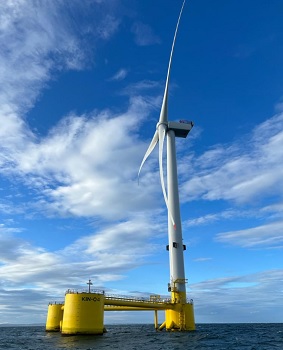
Kotek calls for pause on offshore wind turbines
Gov. Tina Kotek is joining a chorus of voices, including tribes and commercial fishermen, urging the Biden administration to slow down its push for floating wind farms in the Pacific Ocean off the state’s southern coast. Regulators are now preparing a draft report outlining where in the areas turbines may be built safely while minimizing harm to fisheries and marine life. Members of the West Coast fishing industry, however, claim that the bureau is ignoring their concerns. They worry that floating offshore wind farms will displace boats from highly productive fishing grounds and could irreversibly damage the California Current ecosystem. >click to read< 09:20
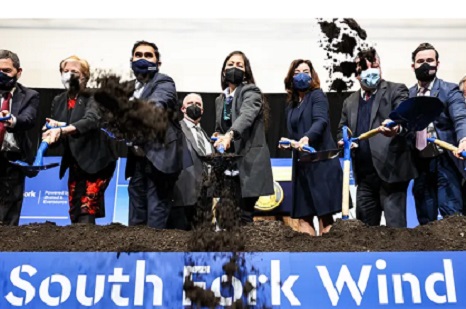
Fishery council executive directors warned Biden admin about dangers wind energy projects pose to fishing industry
In an Aug. 22 letter to former Bureau of Ocean Energy Management (BOEM) Director Amanda Lefton, the three officials, who respectively lead the New England, Mid-Atlantic and South Atlantic Fishery Management Councils, expressed concern about current processes for approving offshore wind development. They also made a series of recommendations to help the federal government mitigate impacts on fisheries. “As we have stated in several past comment letters to BOEM, we are very concerned about the cumulative impacts of multiple wind energy projects on the fisheries we manage,” they stated in the letter. “The multiple wind energy projects planned along the east coast will have cumulative and compounding effects on our fisheries.” >click to read< 08:32
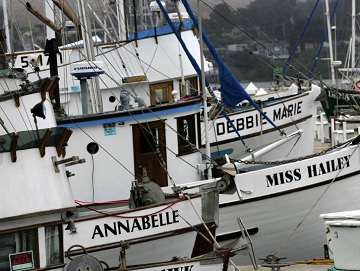
State, federal officials vow to take quick action on Federal Fishery Disaster Declaration for salmon fishing industry
State and federal officials are vowing to move quickly to secure disaster aid for Californians affected by the closure of this year’s commercial and recreational salmon season, which could have an economic impact of $1.4 billion, according to one industry group. The administration of Gov. Gavin Newsom requested a Federal Fishery Disaster Declaration from U.S. Commerce Secretary Gina Raimondo after a decision Thursday by the Pacific Fishery Management Council to recommend full closure of both commercial and recreational salmon seasons this year. It’s unclear what that might mean in terms of total dollars and eligible stakeholders. >click to read< 08:03
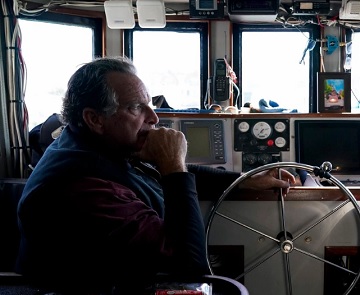
Pacific Fishery Management Council approves salmon fishing ban for much of West Coast
A federal regulatory group voted Thursday to officially close king salmon fishing season along much of the West Coast after near-record low numbers of the fish, also known as chinook, returned to California’s rivers last year. The Pacific Fishery Management Council approved the closure of the 2023 season for all commercial and most recreational chinook fishing along the coast from Cape Falcon in northern Oregon to the California-Mexico border. Limited recreational salmon fishing will be allowed off southern Oregon in the fall. Biologists say the chinook salmon population has declined dramatically after years of drought. Though the closure will affect tens of thousands of jobs, few are opposed to it. Many fishers say they want to take action now to guarantee healthy stocks in the future. >click to read< 09:03
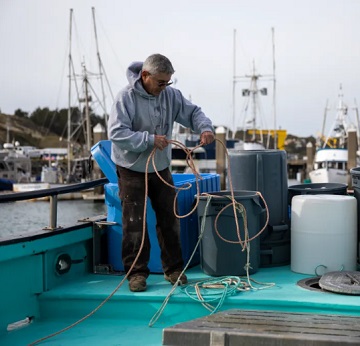
No California salmon: Fishery to be shut down this year
Last year, California’s commercial and recreational fishing fleet, from the Central Coast to the Oregon border, landed about 300,000 salmon. But this year, Davis and other salmon anglers won’t be fishing for salmon at all. Last year, the industry’s economic value was an estimated $460 million for fish sales and related businesses, including restaurants, tackle shops, private fishing guides, campgrounds and other services. Salmon season usually runs from May through October. Only in two previous years — 2008 and 2009 — has California’s salmon season been shut down completely. That closure came as the numbers of spawning fish returning to the Sacramento River, the state’s main salmon producer, crashed to record lows. Now California’s Chinook runs have collapsed again. >click to read< 09:54
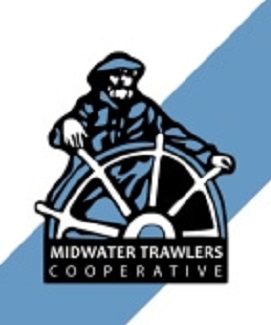
Pacific Fishery Management Council says Rescind Oregon OSW Call Areas
The Pacific Fishery Management Council acted today to join a chorus of voices recommending the Bureau of Ocean Energy Management rescind the current Oregon call areas designated for floating offshore wind energy development. Heather Mann, Executive Director of the Midwater Trawlers Cooperative and one of the leaders of the informal coalition Protect US Fishermen said in her testimony, “we hear the climate crisis is so severe that collateral damage to birds, whales, the California current ecosystem, food security, even to fisheries, fishermen and rural community economies is an accepted part of the transition to cleaner energy. That is an unacceptable premise to me, and I hope it is to you as well.” The motion passed unanimously (10-0) with four abstention votes cast by the state representatives for Oregon, Washington, and California as well as the NMFS representative. >click to read< 19:24
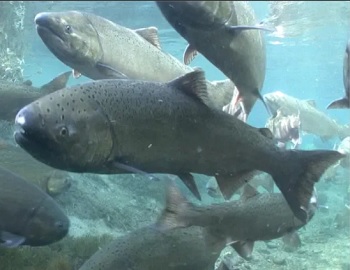
Oregon fishing season called off due to dwindling salmon populations
An extremely low “abundance” of California Chinook salmon stocks and projected low spawning escapements has led to the cancellation of the upcoming commercial and recreational salmon fishing season along most of the Oregon coast. Thursday’s announcement came in two parts from the Oregon Department of Fish and Wildlife, with both actions canceling fishing seasons between March 15 and May 15, 2023. According to Fish and Wildlife, the action applies to all commercial ocean troll salmon fishery seasons from Cape Falcon to the Oregon-California Border. Meanwhile, recreational salmon fishing has been canceled in ocean waters between Cape Falcon and Humbug Mountain off the Oregon coast. >click to read< 08:45
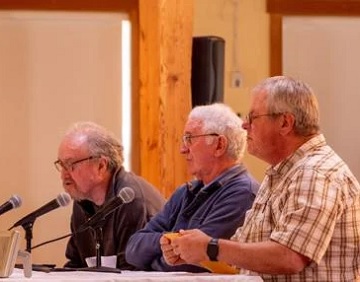
Fishermen urge Oregon Fish and Wildlife Commission to revisit regulations
Several local commercial fishermen have asked the Oregon Fish and Wildlife Commission to reconsider Columbia River fishing regulations. During the public forum section of the commission’s meeting in Astoria on Friday, commercial fishermen and those connected with the industry asked the commission to revisit gillnetting regulations and salmon buyback options. Jim Coleman, a fisherman from St. Helens, asked commissioners to add gillnetting to a future agenda or to work with Washington state to ensure the option of a 6-inch gillnet in the fall. “The gillnet-caught Copper River King salmon is flown from Alaska to Seattle on a chartered jet with great fanfare, demanding $70 to $80 a pound, while commercial fishing on the Columbia River is a political football,” >click to read< 12:18
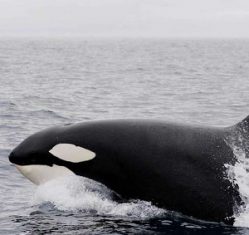
NOAA Ok’s plan to cut West Coast nontribal salmon fishing when fish are needed to feed orca
National Oceanic and Atmospheric Administration Fisheries adopted the plan Tuesday as recommended by the Pacific Fishery Management Council. It calls for restricting commercial and recreational salmon fishing when chinook salmon numbers are especially low. It’s one of the the first times a federal agency has restricted hunting or fishing one species to benefit a predator that relies on it. The fishing restrictions would extend from Puget Sound in Washington to Monterey Bay in central California, and they would be triggered when fewer than 966,000 chinook are forecast to return to Northwest rivers. >click to read< 08:57
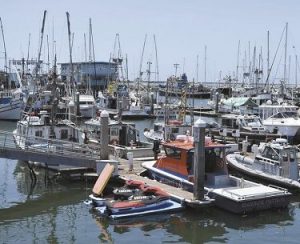
California Fishermen mark a pleasant surprise after preparing for a grim summer. An abundance of fish.
Scott Edson, who fishes out of Half Moon Bay, said this season has been great for everyone, with an abundance of fish in the water not seen in years. “This year is something guys say they haven’t seen in 15 to 20 years. It’s been a pretty good season so far,” Edson said.,,, Don Marshall, who fishes out of Half Moon Bay, said the salmon season had been a lot better than expected, and he had seen more fish than in the last 10 to 15 years. He recently caught 180 salmon totaling around 2,000 pounds, a daily catch worth $13,000 at $6 a pound pricing. “I had the best day I have ever had,,, Nobody expected this many fish, and many fishermen were preparing for a grim summer and other options,” >click to read< 11:17
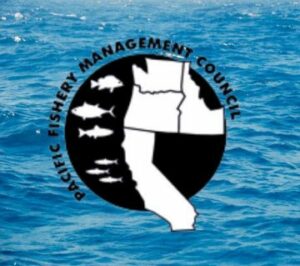
PFMC sets 2021 West Coast ocean salmon season dates
“There will be some restrictive commercial and recreational seasons this year along much of the coast,” said Council Chair Marc Gorelnik. “Forecasts for some Chinook and coho stocks are quite low, which made our job more challenging this year.” The council heard reports from commercial, recreational, and tribal representatives on the challenges caused by the COVID-19 pandemic, as well as ways the council could provide meaningful fishing opportunities and economic support for coastal communities. >click to read< 16:37
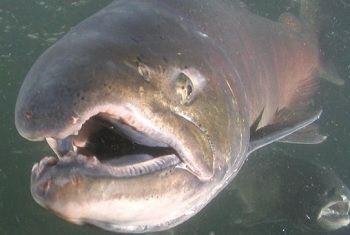
PFMC Recommends Commercial Chinook Fishery Closure in Northern California
The Pacific Fishery Management Council has recommended closing the commercial chinook fishery between the Oregon border and the Fort Bragg area due to low fall salmon returns forecasted for the Klamath River. Meanwhile, the recreational fishery will be open for chinook from June 29 through Aug. 1,,, These recommendations will take effect if adopted by U.S. Secretary of Commerce, Gina Raimondo,,, >click to read< 19:33

NOAA Report: Pacific waters off the West Coast show improved productivity – Cooler temps created a robust environment
Ocean waters off the West Coast showed signs of improved productivity in 2020 after several years of warm water and poor fisheries conditions, The higher productivity seen in 2020 comes after a period of poorer conditions in the Pacific Ocean off the West Coast. “The previous five years, starting in early 2014, were very warm. We were seeing conditions that were not good for the fisheries,” said Toby Garfield, a researcher with NOAA and co-editor of the report. “We’ve had some tough times in the last few years,” said Tracy. “For a lot of species, the cold water regime is favorable, so that’s encouraging.” >click to read< 11:27

Declining salmon runs to restrict 2021 commercial season
During a press briefing on Friday morning, John McManus President of the Golden State Salmon Association said the added restrictions will deal a blow to commercial fishermen. “You may wonder why we’re in this predicament this year, there are some near term and some longer-term reasons why but at the end of the day, we’re seeing a decline in our salmon runs here in the state of California,”,,, Joe Conte said his biggest concern is losing more of his fleet. “I saw a lot of guys just kind of hang it up during crab season, a lot of guys saying they were gonna see how salmon turned out before they made some life decisions,” >click to read< 09:55








